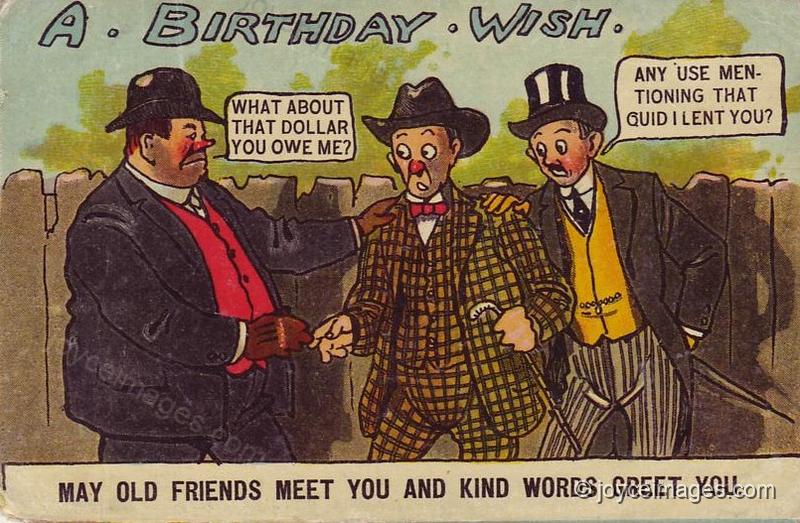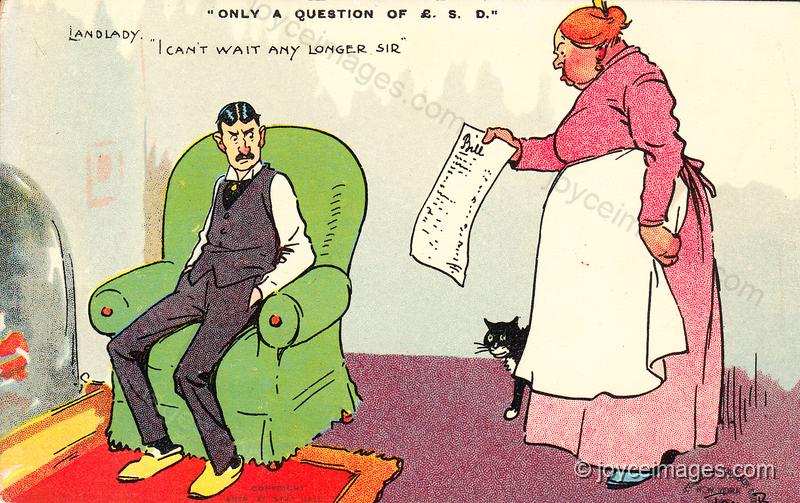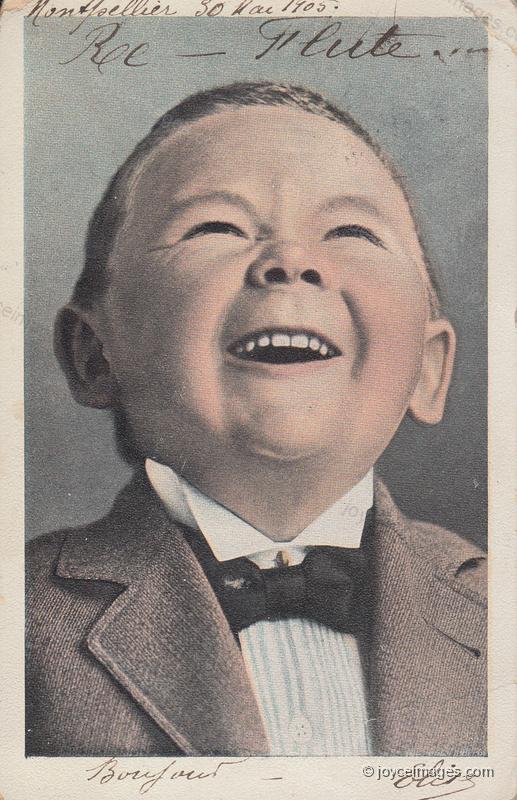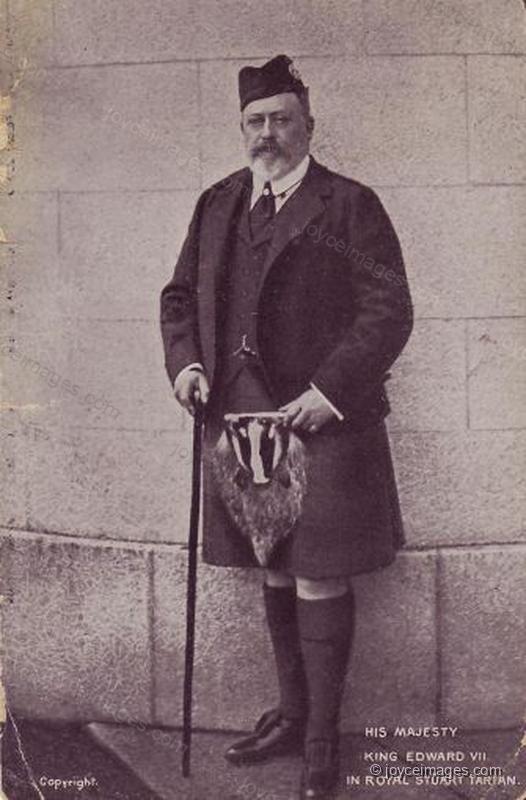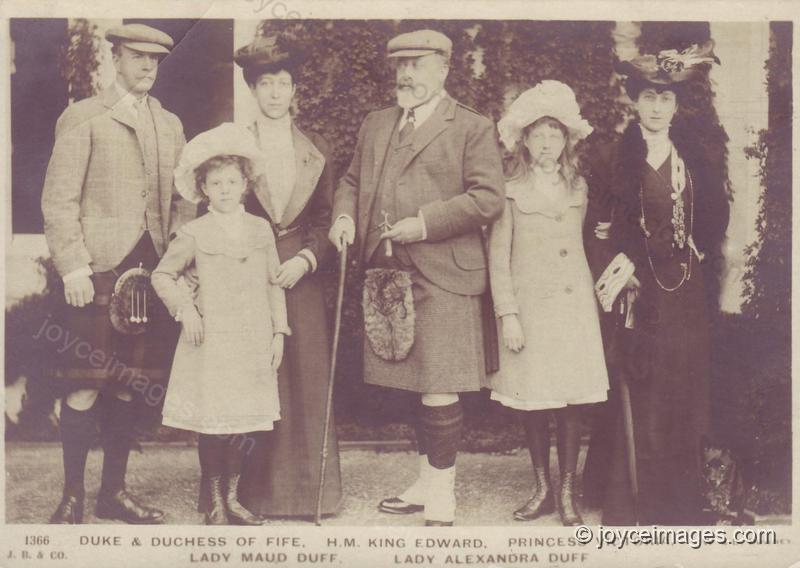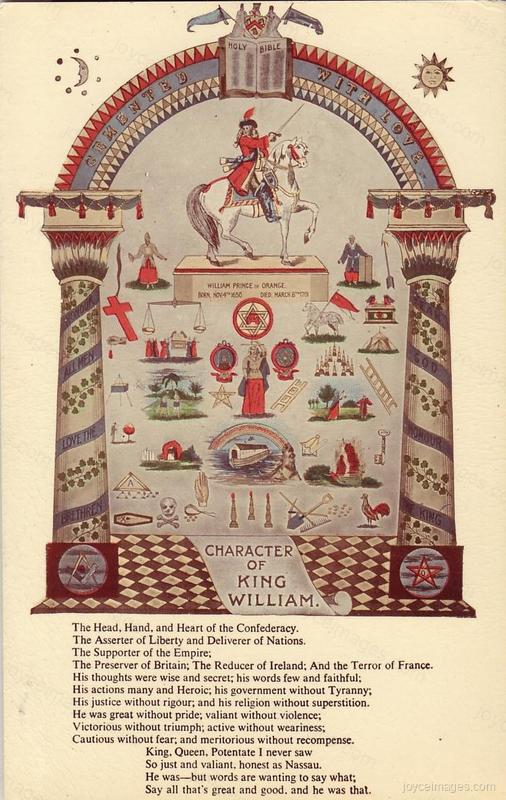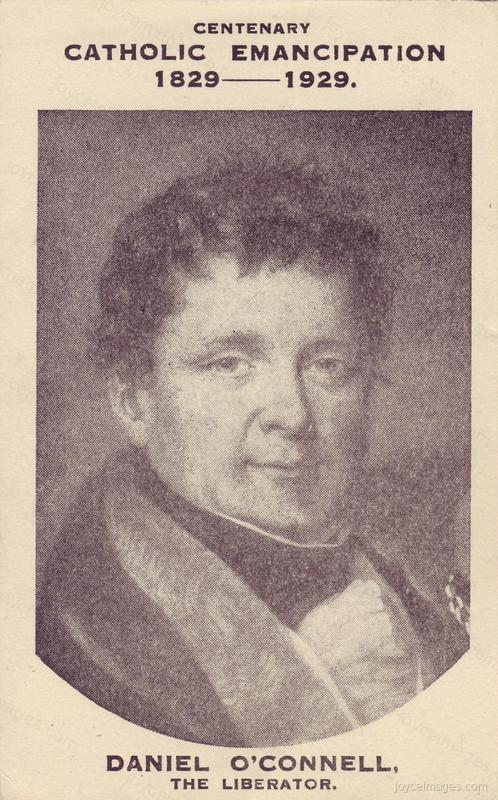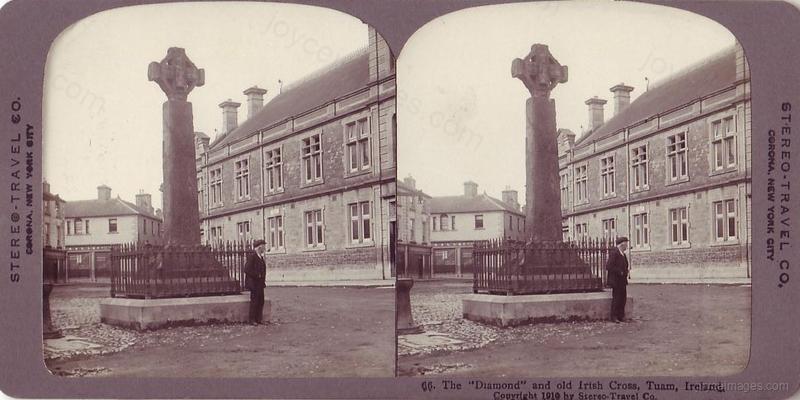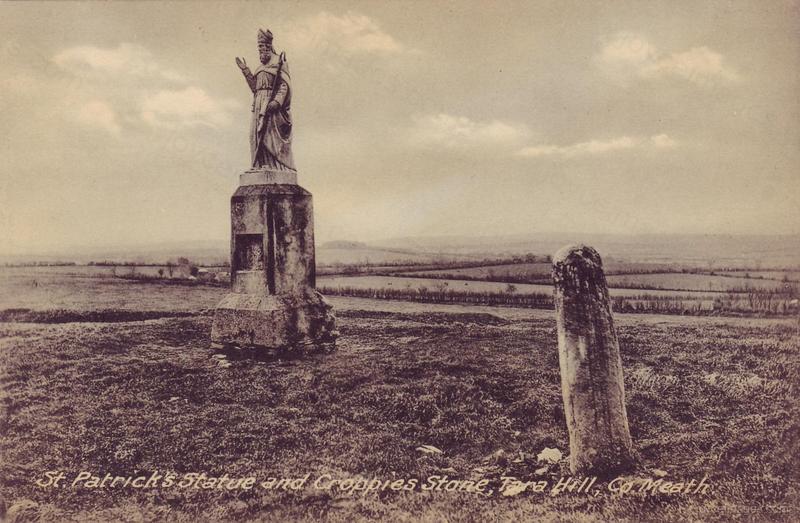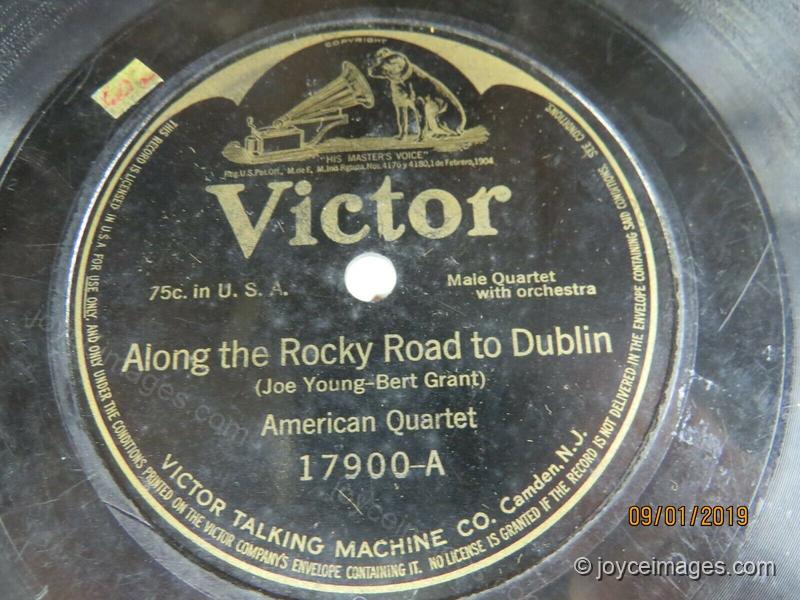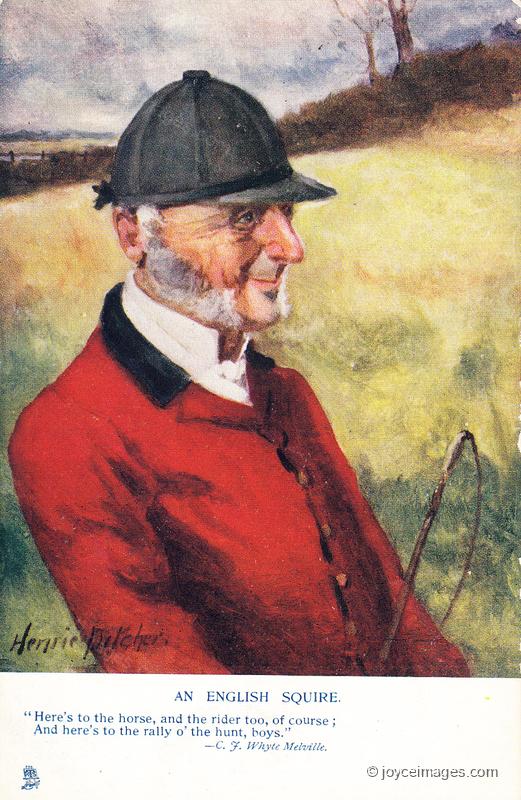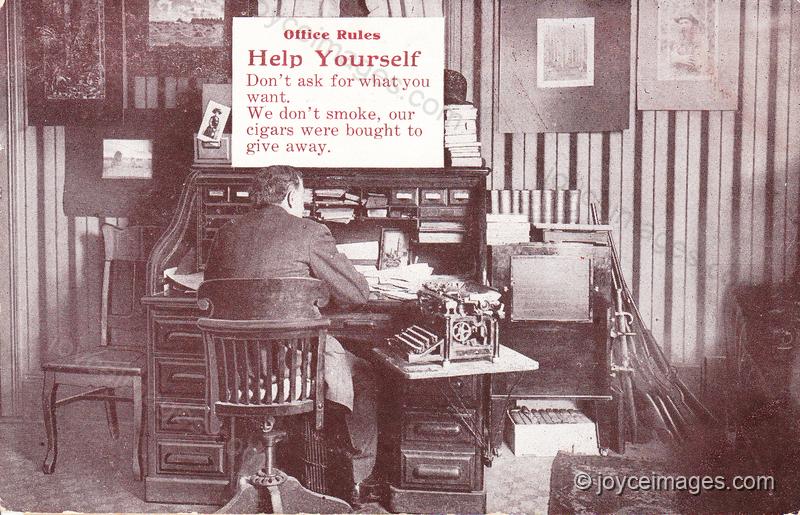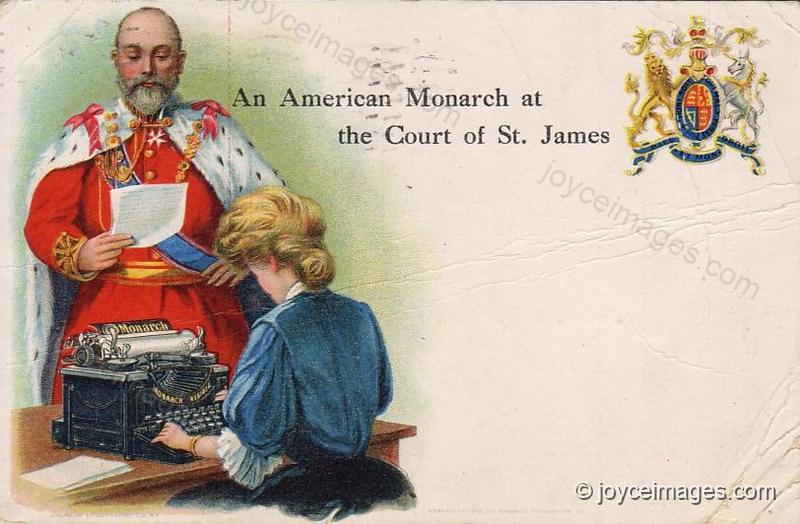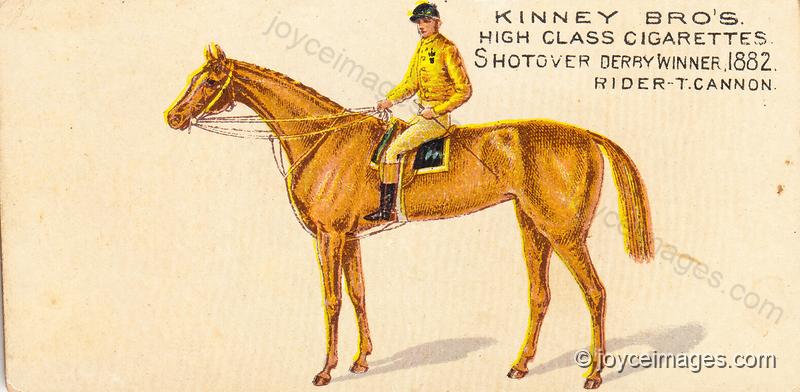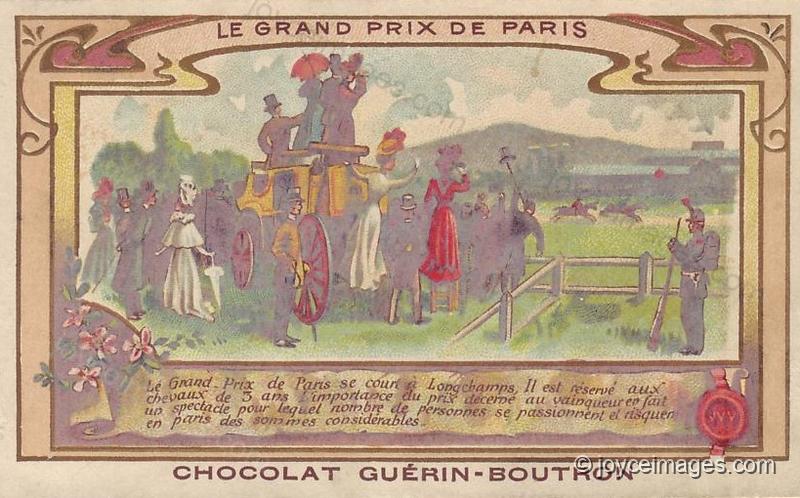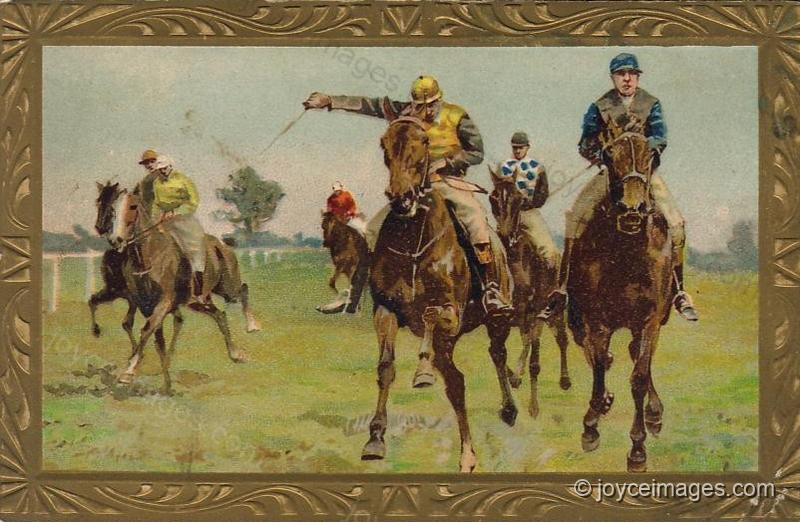"- I paid my way. I never borrowed a shilling in my life. Can you feel that? I owe nothing. Can you?
Mulligan, nine pounds, three pairs of socks, one pair brogues, ties. Curran, ten guineas. McCann, one guinea. Fred Ryan, two shillings. Temple, two lunches. Russell, one guinea, Cousins, ten shillings, Bob Reynolds, half a guinea, Kohler, three guineas,."(U2.253)
Mulligan, nine pounds, three pairs of socks, one pair brogues, ties. Curran, ten guineas. McCann, one guinea. Fred Ryan, two shillings. Temple, two lunches. Russell, one guinea, Cousins, ten shillings, Bob Reynolds, half a guinea, Kohler, three guineas,."(U2.253)
"Mrs MacKernan, five weeks' board. The lump I have is useless.
- For the moment, no, Stephen answered." (U2.258)
- For the moment, no, Stephen answered." (U2.258)
"Mr Deasy laughed with rich delight, putting back his savingsbox.
— I knew you couldn't, he said joyously. But one day you must feel it. We are a generous people but we must also be just.
— I fear those big words, Stephen said, which make us so unhappy." (U2.261)
— I knew you couldn't, he said joyously. But one day you must feel it. We are a generous people but we must also be just.
— I fear those big words, Stephen said, which make us so unhappy." (U2.261)
"Mr Deasy stared sternly for some moments over the mantelpiece at the shapely bulk of a man in tartan filibegs: Albert Edward, prince of Wales.
- You think me an old fogey and an old tory, his thoughtful voice said. I saw three generations since O'Connell's time. I remember the famine in '46." (U2.265)
Mr. Deasy's wall hanging is a bit out of date: in 1904, Albert Edward Prince of Wales had become H.M. King Edward VII. He reigned from 1901, when his mother Queen Victoria died, to his own death in 1910. He is seen in this PC wearing royal Stuart tartan filibegs.
- You think me an old fogey and an old tory, his thoughtful voice said. I saw three generations since O'Connell's time. I remember the famine in '46." (U2.265)
Mr. Deasy's wall hanging is a bit out of date: in 1904, Albert Edward Prince of Wales had become H.M. King Edward VII. He reigned from 1901, when his mother Queen Victoria died, to his own death in 1910. He is seen in this PC wearing royal Stuart tartan filibegs.
Albert Edward was an elegant dresser, and indeed of significant bulk, with a waistline of 39" in 1860 and 47" in 1905.
"Do you know that the orange lodges" (U2.270)
The Orange Institution (or Orange Order) is a Protestant fraternal organisation based in N. Ireland and Scotland. It was founded in Co. Armagh in 1795, during the inter-communal violence of the 1790s that opposed Protestants and Catholics. The Order's name comes from William of Orange, the Protestant Dutch prince who became William III King of England and Ireland 1689 - 1702. The roots of the Orange Order can be traced back to the conflicts that arose from the Plantation of Ulster, particularly the Irish Rebellion of 1641, and the Williamite War in the 1690s that opposed the Williamites to the Jacobites (the forces of King James II, a Catholic). The parades of the Orange Order commemorate William's victories in the Battles of the Boyne (1690) and Aughrim (1691), that annihilated the Jacobites. This PC shows the banner of one of the Orange lodges.
The Orange Institution (or Orange Order) is a Protestant fraternal organisation based in N. Ireland and Scotland. It was founded in Co. Armagh in 1795, during the inter-communal violence of the 1790s that opposed Protestants and Catholics. The Order's name comes from William of Orange, the Protestant Dutch prince who became William III King of England and Ireland 1689 - 1702. The roots of the Orange Order can be traced back to the conflicts that arose from the Plantation of Ulster, particularly the Irish Rebellion of 1641, and the Williamite War in the 1690s that opposed the Williamites to the Jacobites (the forces of King James II, a Catholic). The parades of the Orange Order commemorate William's victories in the Battles of the Boyne (1690) and Aughrim (1691), that annihilated the Jacobites. This PC shows the banner of one of the Orange lodges.
"agitated for repeal of the union twenty years before O'Connell did or before the prelates of your communion denounced him as a demagogue? You fenians forget some things." (U2.271)
The Act of Union (1801) merged the Parliaments of the Kingdom of Great Britain and the Kingdom of Ireland to form the 'United Kingdom of Great Britain and Ireland.' Daniel O'Connell campaigned for repeal of the union, set up the Repeal Association, and argued for the re-creation of an independent Kingdom of Ireland with Victoria as its Queen. He held a series of 'Monster Meetings' (so called for the huge attendance at each) throughout Ireland, often in places of historic Irish interest. After a successful Monster Meeting in Tara, one was planned for October 1843 in Clontarf (Co. Dublin), symbolic for its association with Brian Boru and the Battle of Clontarf (1014). The British Prime Minister Sir Robert Peel forbade it. Despite pleas from his supporters, and the prediction that a million people were planning to attend, O'Connell decided not to defy the authorities and called off the meeting. Still, he was arrested and jailed 3 months for sedition. With a moratorium on Monster Meetings, and his followers disappointed in him, O'Connell made no further progress in the campaign for Repeal.
The Act of Union (1801) merged the Parliaments of the Kingdom of Great Britain and the Kingdom of Ireland to form the 'United Kingdom of Great Britain and Ireland.' Daniel O'Connell campaigned for repeal of the union, set up the Repeal Association, and argued for the re-creation of an independent Kingdom of Ireland with Victoria as its Queen. He held a series of 'Monster Meetings' (so called for the huge attendance at each) throughout Ireland, often in places of historic Irish interest. After a successful Monster Meeting in Tara, one was planned for October 1843 in Clontarf (Co. Dublin), symbolic for its association with Brian Boru and the Battle of Clontarf (1014). The British Prime Minister Sir Robert Peel forbade it. Despite pleas from his supporters, and the prediction that a million people were planning to attend, O'Connell decided not to defy the authorities and called off the meeting. Still, he was arrested and jailed 3 months for sedition. With a moratorium on Monster Meetings, and his followers disappointed in him, O'Connell made no further progress in the campaign for Repeal.
"Glorious, pious and immortal memory. The lodge of Diamond in Armagh the splendid behung with corpses of papishes. Hoarse, masked and armed, the planters' covenant." (U2.273)
"The black north and true blue bible. Croppies lie down." (U2.275)
'Croppy' from the 1790s was used in Ireland for people with closely cropped hair, a fashion associated with the anti-wig (anti-aristocrat) French revolution, hence connotating sympathy with the Society of United Irishmen. 'Croppies Lie Down' is a popular loyalist song, while 'The Croppy Boy' (sung in Sirens), is a sympathetic rebel song.
'Croppy' from the 1790s was used in Ireland for people with closely cropped hair, a fashion associated with the anti-wig (anti-aristocrat) French revolution, hence connotating sympathy with the Society of United Irishmen. 'Croppies Lie Down' is a popular loyalist song, while 'The Croppy Boy' (sung in Sirens), is a sympathetic rebel song.
"Stephen sketched a brief gesture.
— I have rebel blood in me too, Mr Deasy said. On the spindle side. But I am descended from sir John Blackwood who voted for the union. We are all Irish, all kings' sons.
— Alas, Stephen said.
— Per vias rectas, Mr Deasy said firmly, was his motto. He voted for it and put on his topboots to ride to Dublin from the Ards of Down to do so.
Lal the ral the ra
The rocky road to Dublin." (U2.277)
— I have rebel blood in me too, Mr Deasy said. On the spindle side. But I am descended from sir John Blackwood who voted for the union. We are all Irish, all kings' sons.
— Alas, Stephen said.
— Per vias rectas, Mr Deasy said firmly, was his motto. He voted for it and put on his topboots to ride to Dublin from the Ards of Down to do so.
Lal the ral the ra
The rocky road to Dublin." (U2.277)
"A gruff squire on horseback with shiny topboots. Soft day, sir John! Soft day, your honour! .... Day! .... Day! .... Two topboots jog dangling on to Dublin. Lal the ral the ra. Lal the ral the raddy. — That reminds me, Mr Deasy said. You can do me a favour, Mr Dedalus, with some of your literary friends. I have a letter here for the press. Sit down a moment. I have just to copy the end." (U2.286)
"He went to the desk near the window, pulled in his chair twice and read off some words from the sheet on the drum of his typewriter.
— Sit down. Excuse me, he said over his shoulder, the dictates of common sense. Just a moment.
He peered from under his shaggy brows at the manuscript by his elbow and, muttering, began to prod the stiff buttons of the keyboard slowly, sometimes blowing as he screwed up the drum to erase an error." (U2.292)
— Sit down. Excuse me, he said over his shoulder, the dictates of common sense. Just a moment.
He peered from under his shaggy brows at the manuscript by his elbow and, muttering, began to prod the stiff buttons of the keyboard slowly, sometimes blowing as he screwed up the drum to erase an error." (U2.292)
"Framed around the walls images of vanished horses stood in homage, their meek heads poised in air: lord Hastings' Repulse, the duke of Westminster's Shotover," (U2.300)
"the duke of Beaufort's Ceylon, prix de Paris, 1866." (U2.301)
The Prix de Paris is a race for 3 year old horses run in Longchamps, France. It involves, this card states, considerable amounts of prize money.
The Prix de Paris is a race for 3 year old horses run in Longchamps, France. It involves, this card states, considerable amounts of prize money.
